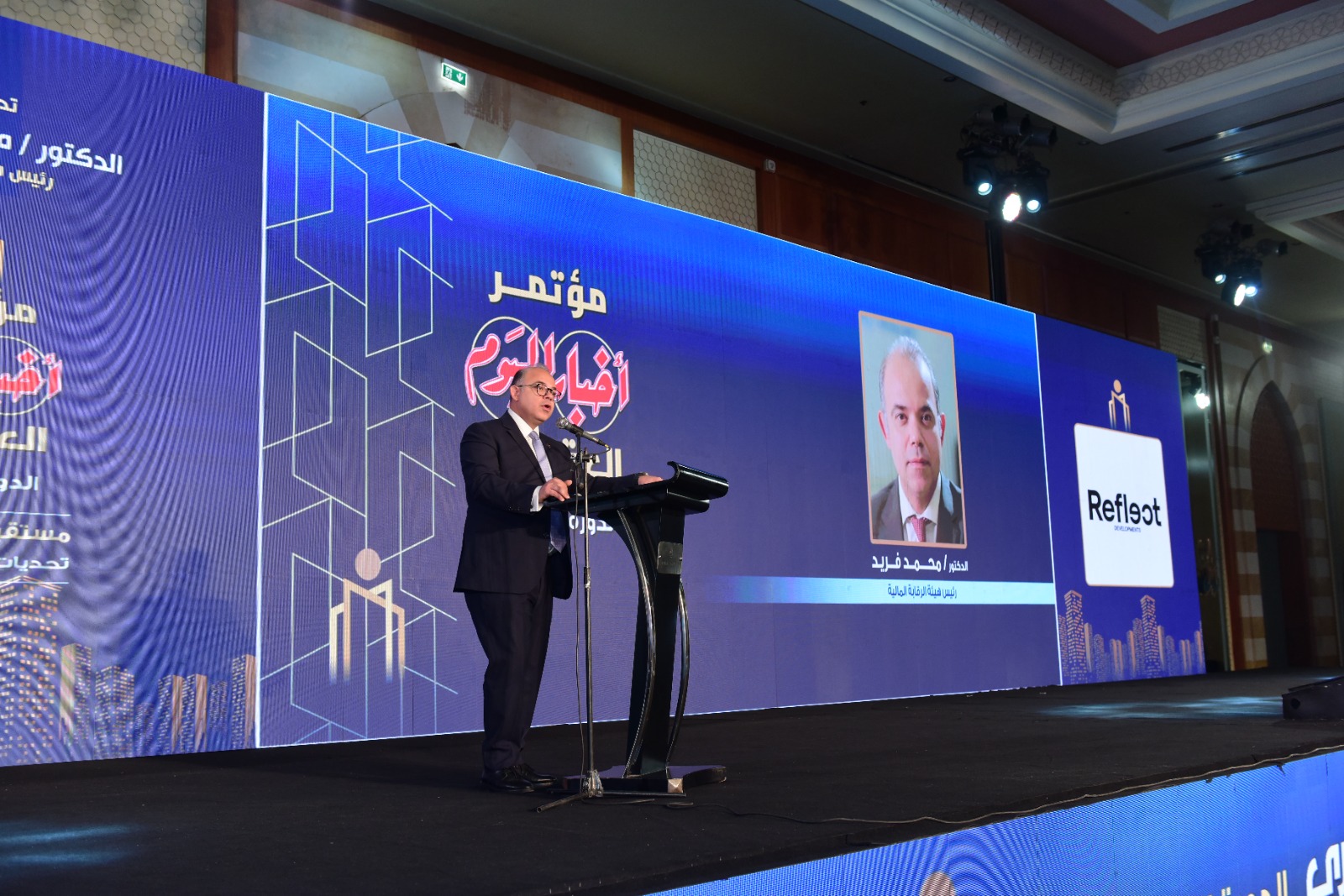Dr. Mohamed Farid – FRA Chairman:
- Non-bank financial sector is prepared to offer comprehensive financing solutions for Egypt’s urban development.
- Listing on stock exchanges, issuing bonds, securitization and Sukuk are vital financing solutions. Notably, urban communities have pioneered the issuance of EGP 60 billion in securitization bonds.
- FRA is finalizing a new regulatory framework for digital real estate platforms.
- FRA is holding an open dialogue with real estate developers and their digital platforms. This initiative aims to understand their business models and inform them of the regulatory and legal steps needed to formalize their operations. The main goals are to protect consumers and support the stability of established companies.
- Digital platforms have already started transitioning to operate under real estate investment fund regulations, with feasibility studies already submitted to FRA.
- Listing companies’ shares on the Stock Exchange is a powerful tool that helps them achieve sustainable business development, enhance governance standards and attract investments.
- Improved Egyptian Accounting Standards (EAS) have enabled companies to accurately report their financial status and operational performance.
Dr. Mohamed Farid, FRA Chairman delivered a keynote speech at the fifth edition of Akhbar Al-Youm Real Estate Conference, themed “The Future of the Real Estate Industry: Challenges, Development, Investment.” His address highlighted the critical role of the non-bank financial sector in providing diverse financing opportunities to help the real estate sector achieve its goals.
The conference’s opening session featured several prominent figures, including Dr. Ashraf Sobhy, Minister of Youth and Sports; Eng. Sherif El-Sherbiny, Minister of Housing, Utilities, and Urban Communities; Dr. Ibrahim Saber, Governor of Cairo; Eng. Adel El-Naggar, Governor of Giza; and numerous leading real estate developers.
During his speech, Dr. Farid detailed comprehensive financing solutions and services offered by the non-bank financial sector, all operating under FRA’s supervision. He underscored the importance of listing and offering shares on the stock exchange as a powerful mechanism for companies to secure funding and reach their objectives. He also emphasized securitization bonds and sukuk as valuable capital market tools accessible even to unlisted companies. Additionally, Dr. Farid noted the recent developments in accounting standards, which now enable companies to revalue their assets at market prices.
Dr. Farid highlighted securitization bonds and sukuk as vital financing mechanisms available through the capital market that even unlisted companies can leverage. He specifically noted that the New Urban Communities Authority (NUCA) has been a major beneficiary of these instruments over the past two years, particularly through its issuance of securitization bonds.
FRA Chairman also addressed the role of real estate funds and how to utilize them. He revealed that FRA is nearing completion of a study to issue new regulations governing the operation of electronic platforms in the real estate sector.
He explained that FRA has recently held a series of meetings. This aligns with their ongoing approach of fostering active dialogue with all stakeholders to issue decisions and regulations that have a real developmental impact on the sectors and activities under their supervision. He underscored that FRA’s unwavering focus is on safeguarding consumer rights, ensuring market stability and verifying the financial soundness and professional conduct of service providers. Recent meetings brought together key leaders from the real estate development sector and the operators of digital platforms involved in selling real estate shares to the public.
During these discussions, FRA outlined its regulatory vision for these activities, making sure they comply with the non-bank financial laws that govern these financial services. A significant outcome of these meetings was the agreement that the real estate fund model represents the most legally sound and practical approach. This consensus stems from the recognition of the real estate market’s increasing need for diversified financing sources and individuals’ desire for investment products that enable participation in the real estate sector with robust governance and protection.
Dr. Mohamed Farid, FRA Chairman emphasized FRA’s commitment to hold discussions with all market stakeholders. This continuous engagement aims to drive further development, unlock new opportunities for companies and clarify the benefits of recent reforms. It also seeks to foster a shared understanding and common language between the government and private sectors. Dr. Farid emphasized that FRA’s prior discussions with stakeholders were crucial in effectively addressing the attendees’ detailed inquiries.
As a direct outcome of these dialogues, three entities managing digital platforms have approached FRA, seeking to regularize their operation. Each is now in the process of establishing two new companies: one for a real estate investment fund and another for promotion, underwriting and investment fund management.
This positive response from companies highlights a growing recognition of the importance of legal compliance and a desire to operate under a robust regulatory framework. Such oversight will ensure the provision of monitored and organized services, safeguarding the rights of all transacting parties. This, in turn, will broaden public access to various financial instruments offered by the sector, promoting comprehensive financial, investment and insurance inclusion, ultimately benefiting real estate funds.
FRA Chairman further pointed out that listing and offering shares on stock exchanges empowers companies to achieve substantial business growth and boost their equity. A significant number of real estate developers have already leveraged stock exchange listings, experiencing considerable increases in their equity, regardless of their size. Furthermore, adherence to listing and trading requirements has enhanced these companies’ opportunities for both domestic and international expansion.
Dr. Farid highlighted the comprehensive overhaul of Egyptian Accounting Standards over the past period. A key change was shifting from book value to fair value for asset valuation, a move that includes real estate investments and equity. This reform introduced a revaluation model for fixed and intangible assets and a fair value model specifically for real estate investments. These updates ensure companies’ financial statements accurately reflect the fair value of their assets, thus empowering them to present a true picture of their financial position and performance, and ultimately supporting sound financing and investment decisions.
Last modified: July 2, 2025
